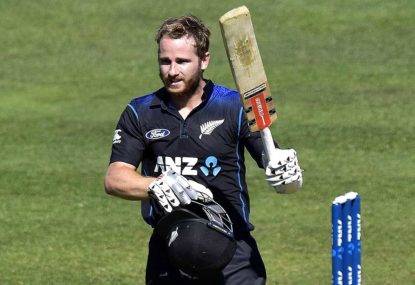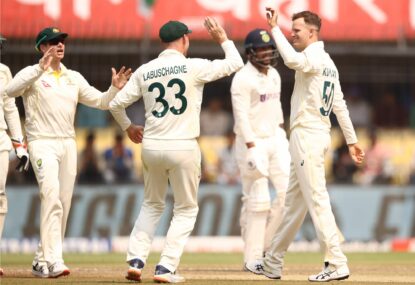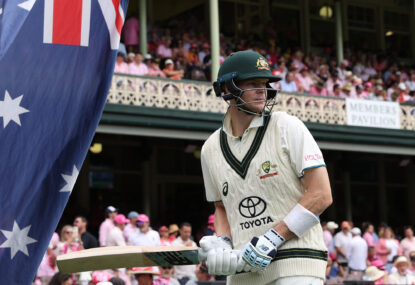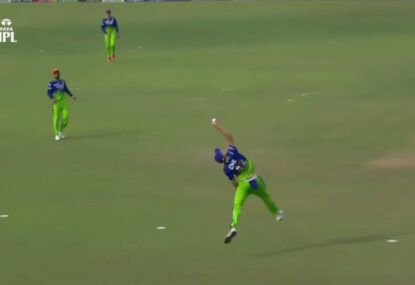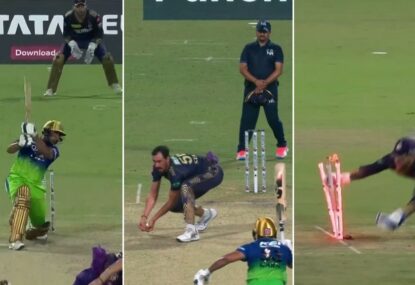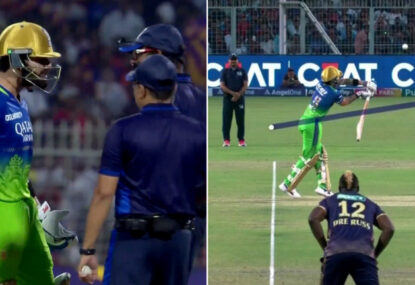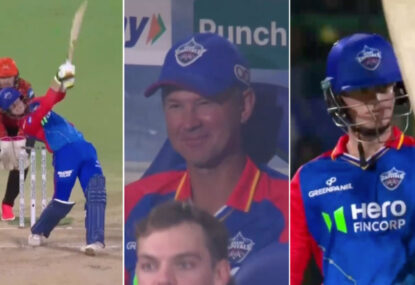Australia and New Zealand are the two best ODI teams in the world and fittingly they’ll square off in the final of the Cricket World Cup.
Although the Kiwis only just scraped past the South Africans, it was a deserved win considering how well they’ve played the entire tournament.
Brendon McCullum and Trent Boult have been the standouts, but it’s been a true team performance, with different individuals stepping up in different moments.
As for the Australian’s, their semi-final win over the Indians was as clinical as it gets.
Scoring 328 – largely thanks to a superb Steve Smith innings – on what turned out to be a tricky wicket, was just too big of a total for the Indian batsman to chase down. Masterfully guided by Michael Clarke, who was very aggressive with his bowling changes, the bowling unit never let the Indians get into the match.
However, Clarke did make the mistake of bowling James Faulkner early in the innings. Faulkner is a master of bowling at the death overs and there aren’t too many cricketers in the world who can bowl as well as him at the end of innings and during powerplays. But he isn’t as successful early in the innings.
Faulkner should never bowl before the 15th over and should always have seven overs up his sleeve to bowl in the last 20 overs. That’s how you use James Faulkner, he’s ‘The Finisher’.
Moving onto the final, the trans-Tasman rivals seem to be very evenly matched. Both sides have plenty of power with the bat and ball, while also possessing variety and adaptability.
But which team has the edge? Let’s compare and rate the two sides to see how they match up in different facets of the game.
The openers
Aaron Finch and David Warner form what should be the best opening tandem in the world, though unfortunately that hasn’t been the case. While they have both had their moments, it just hasn’t clicked yet as a partnership. They’ll be looking to turn that around in the final.
Martin Guptill and Brendon McCallum on the other hand have been rock solid. They compliment each other really well, when one of them fails the other normally goes on and makes a big score. McCullum’s the big wicket, if he faces more than 50 balls the game could be over.
Advantage: New Zealand
The spine
Batting positions three, four and five, or the spine, hold the line-up together. Like the openers, the Aussies should be very strong in this area but for varying reasons they’ve struggled. Although Smith is in great touch, Clarke and Shane Watson are not.
While Watson’s move down the order has helped, he’s still not the same ODI player we’ve seen the past few years. And Clarke, due to injury, a game being washed out and the promoting of Glenn Maxwell up the batting order, just hasn’t been able to spend time out in the middle.
Grant Elliott’s heroics aside, New Zealand’s middle order also hasn’t totally fired either. Prior to the World Cup Kane Williamson was lumped into the same bracket as AB de Villiers for best ODI batsman in the world. While the latter lived up to hype, Williamson so far has not. Could the final be his coming out party?
Advantage: even
The finishers
Big late order hitting is what propels a decent score into a huge one. It’s no surprise then that the two teams with the most power down the batting order have reached the final.
Elliott, Corey Anderson and Luke Ronchi have at times destroyed the opposition bowlers at the death of the innings. However, I have doubts they’ll have the same success against the Aussie bowlers.
The last time the two sides met, at Eden Park, Corey Anderson struggled to get going, with the Australian bowlers employing similar tactics to the one used against MS Dhoni in the semi-final. Bowling back of a length outside off stump, Anderson, much like Dhoni, wasn’t afforded the freedom to swing his arms and clear the fences.
Unless he takes apart the fifth bowler, where he might get some loose deliveries, I don’t see Anderson being his dominant self. As for Ronchi, I just picture the guy who burst onto the scene as a young West Australian but struggled for the majority of his domestic one-day career.
The biggest strength of the Australian batting line-up is the power it possesses down the order. Not just hitters five, six and seven, this is a line-up that features Brad Haddin coming in at number eight And let’s not forget the damage Mitchell Johnson inflicted upon the Indians in the semi-final as well.
Besides a fired up Brendon McCullum, there isn’t a more scary proposition in cricket than bowling to Glenn Maxwell at the end of the innings. Throw in James Faulkner, the master finisher, and you have the most powerful lower order ever assembled.
Advantage: Australia
Bowling powerplays
Trent Boult has been fantastic opening the bowling while Tim Southee’s had mixed results. Matt Henry could be the one the Aussies really go after as soon he comes on to bowl.
Starc’s been super all tournament but his new-ball partners had struggled until Josh Hazlewood returned to the side. Coming in at the expense of Pat Cummins has dramatically improved Australia’s bowling in the opening 10 overs.
As I wrote in an earlier piece, Josh Hazlewood is the perfect fit for this side, complimenting the attacking nature of the other quicks in the team. It’s allowed Mitchell Johnson to bowl first change, which is working beautifully.
Advantage: Australia
Middle overs
As mentioned above, with Hazlewood opening the bowling, Johnson now bowls most of his overs through the middle of the innings. What a luxury to have such an attacking bowler charging in at a time when most batsman are trying to conserve their wicket for the last 15 overs.
New Zealand will be relying on Dan Vettori to tie down the Aussie batsman during the middle overs, hoping to frustrate them into making a mistake.
Advantage: even
Death bowling
This is where Australia has a big advantage over New Zealand. Starc and Faulkner are two of the best death bowlers in the world. While the Kiwis are suspect in this department. If the Aussies have wickets in hand in the last 10 overs, bad things will happen to the Kiwis.
Advantage: Australia
The verdict
Australia is the better team. If the final were played out over five matches, the Aussies would win the majority. But it’s a one-off game and anything can happen in a knockout final.
There’s enough fire power in this New Zealand team to win, but a lot will need to go right for them to do so. They’ll need to take early wickets and continue to take them throughout the Australian innings. More than likely, if New Zealand are to win they’ll need to bowl the Aussies out.
Batting wise, the Kiwis can’t be so reliant on McCullum. It’s time for Williamson to step up and prove he’s one of the best batsman in the world, and what better time to do it than in a World Cup final.
As for the Aussies, the game plan should be pretty simple – get McCullum out cheaply and don’t lose early wickets when batting.
If Warner and Finch can negotiate the first 10 overs, the game will get a whole lot easier from there. They should be able to feast on Anderson and an inexperienced Henry, while laying the foundations for a Maxwell onslaught.
There are only two ways I see Australia losing. Firstly, if Brendon McCullum scores the fastest century in World Cup history, and secondly, if Australia collapse at the start of their batting innings.
However, I do have visions and nightmares of Australian-raised Luke Ronchi hitting the winning runs of the match, while South African born Grant Elliott, who did the same thing against his ‘home’ country in the semi-final, watches on from the other end.
Barring any of the above three things happening, the Australians should win. After a long summer – one that started off in such a horrible way – there would no better feeling than lifting the World Cup trophy in front of 100,000 screaming Aussie fans.
But even if Australia don’t win the World Cup, there will be at least one Aussie celebrating, right next to a South African.





























































































